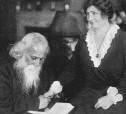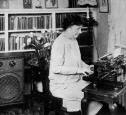|
Almost 20 years before
she addressed Rotary International in convention in June of 1957 in
Switzerland, Helen Keller was first introduced to Rotary through an
article she wrote for the March 1938 issue of The Rotarian.
In a featured position in the magazine, it was different from other
selections of her work, as Keller spent her “space” discussing what
teacher Anne Sullivan has meant to her.
Doug Rudman
She Also Made
Circumstances
By
Helen Keller
NO QUESTION is more
pressing than this: can we master Fate?
As I know from recent
travel, that query is still answered negatively in sequestered parts of
the world. Uncounted folk still labor without hope of adequate
recompense from dawn until dusk. With the sages of old they say, "What
was good for my ancestors is good for me." Patient fatalists, they work
on in antique garb, using implements older than their empires. The
mountains may rise and sink, the stars may shift, the ocean may recede
farther and farther from its ancient shores, but these human automatons
change their circumstances little or not at all.
The earth they till
absorbs their bodies generation after generation; yet they ask for
nothing, since they believe it is enough that the earth gives back to
them their life with strength renewed for their toil. They accept Fate.
On the other hand, the
sons of the Renaissance and the Industrial Revolution assert their power
over destiny. They are animated by the same spirit as was Napoleon when
a general told him that circumstances would render an attack impossible.
"I make circumstances," he said. Multitudes of these sons have worked as
free men inspired by a purpose – to transform age-long drudgery into an
order of things where hands shall create joyously, mind put forth richer
blossoms, and knowledge reach wider horizons. They have shared, if to a
limited degree, in the fruits of the mighty enterprises they have
wrought. Continents have been opened and schools have been established
on the principle that education is the common property of all. Our
civilization is winged with steam and electricity. Despite tragic
blunders and enslavements, this endeavor has brought genuine well-being
to the largest number of people in the history of economic
administration. |
Thus has grown the great
philosophy of making circumstances. It has fostered the noblest
individuality and the finest sensibilities. Out of this expanded and
enriched human nature has come the deliverance of those whose lives Fate
seemed to have hopelessly wrecked. In it the crippled of mind and body
found a savior. Free men gave the blind and the deaf all possible
knowledge to circumvent fettering limitations that they might take their
places with normal people in the work and play of the world.
Anne Sullivan played a
part in this. Herself a maker of circumstances, she carried still
further the work of human emancipation.
She was born of poor
Irish immigrants. She was partially blind and untaught. Her parents
died. She was flung into the obscurity of an almshouse. Yet by sheer
will power and intelligence she pulled herself out of that sordid
environment. At the age of 14 she won a transfer to an institution for
the blind, where she learned to read with her fingers. Several years
later an operation gave her more sight, and she learned to read all over
again, this time with her eyes, though they were never strong.
To her, there came one
day a letter from a far-off country town in the State of Alabama telling
of a little deaf-blind child who had no language but a cry. "Please send
me," Anne Sullivan asked. Soon she left the few friends she had and
traveled alone to rescue the small captive marooned on the bleak desert
of darkness and silence.
Her work required
ingenuity, infinite patience, perseverance, and, above all, love. For I
was not only blind, deaf, and mute – but I was violently rebellious and
destructive. Resolutely, my kind young teacher subdued me, until I had
learned obedience without which I could not be taught or gain freedom.
Her knowledge of books was scanty, and there was no one near to advise
her in her new situation. Day after day, year in and year out, she
toiled, devising means to set me free. By thinking her own thoughts and
experimenting fearlessly, she won back for me the wonder-world of
childhood she had been denied. Nobody, I think, would consider it a wild
exaggeration if Anne Sullivan had said with Napoleon, "I make
circumstances."
|




